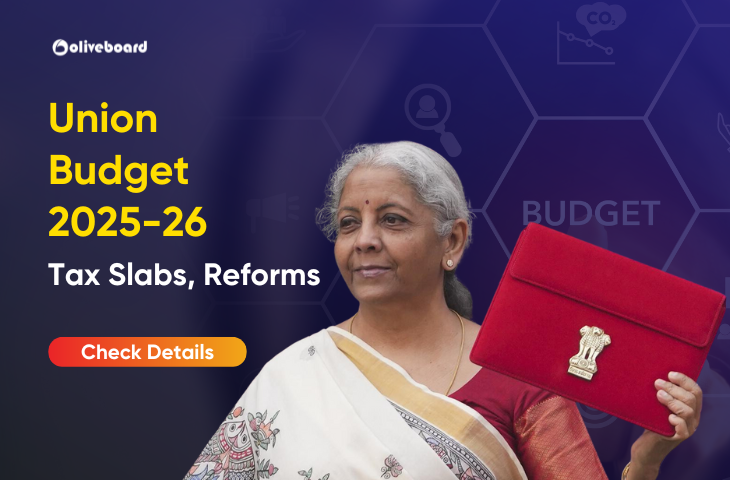Union Budget 2025-26: The Finance Minister Nirmala Sitharaman has released Union Budget 2025-26 on 1st February 2025 with big changes. The Union Budget for 2025-26 has introduced significant reforms aimed at simplifying the taxation system and providing relief to taxpayers. The new tax reforms has given a relief to middle class, leaving more money in their hands, boosting household consumption, savings and investment. In this article, we will break down the new income tax slabs of Union Budget 2025-26, explore key changes in tax regulations, and understand how these reforms can benefit taxpayers across India.
Also Read: Union Budget 2025-26, Check Key Highlights
New Income Tax Slabs for Union Budget 2025-26
The Union Budget 2025-26 introduces a revamped set of income tax slabs designed to provide greater relief to individual taxpayers, particularly those earning up to ₹12 lakh. Let’s compare the revised tax slabs with the earlier ones and understand the tax rebate that makes income up to ₹12 lakh tax-free.
Revised Tax Slabs (2025-26)
| Income Range | Tax Rate |
| ₹0 – ₹4,00,000 | No Tax |
| ₹4,00,001 – ₹8,00,000 | 5% |
| ₹8,00,001 – ₹12,00,000 | 10% |
| ₹12,00,001 – ₹16,00,000 | 15% |
| ₹16,00,001 – ₹20,00,000 | 20% |
| ₹20,00,001 – ₹24,00,000 | 25% |
| Above ₹24,00,000 | 30% |
Earlier Tax Slabs (FY 2024-25)
| Income Range | Tax Rate |
| Up to ₹3,00,000 | No Tax |
| ₹3,00,001 – ₹7,00,000 | 5% |
| ₹7,00,001 – ₹10,00,000 | 10% |
| ₹10,00,001 – ₹12,00,000 | 15% |
| ₹12,00,001 – ₹15,00,000 | 20% |
| Above ₹15,00,000 | 30% |
How Income Up to ₹12 Lakh Becomes Tax Free?
Under the new tax regime of Union Budget 2025-26, individuals with a taxable income up to ₹12 lakh (₹1 lakh per month) will pay no tax. This is made possible by a tax rebate under Section 87A, which allows taxpayers with income up to ₹12 lakh to claim full tax exemption. For salaried individuals, the limit increases to ₹12.75 lakh due to a ₹75,000 standard deduction. This means that many middle-class earners can keep more of their income, which helps with savings, investment, and spending, contributing to overall economic growth.
For Example: If you earn ₹8 lakh annually, the revised tax regime, combined with the rebate, ensures that you pay no tax. You want to know how?
Tax Calculation:
₹8 lakh – ₹12 lakh
= ₹4 lakh that will attract 10% tax on ₹4 lakh
= ₹40,000
Although the tax slabs specify rates for incomes starting from ₹8 lakh, the tax rebate ensures that individuals in these brackets effectively pay no tax, as the rebate eliminates up to ₹40,000 of their liability.
Key Tax Reforms and Updates from Union Budget 2025-26
1. No Tax Up to ₹12 Lakh Income
- The new income tax regime ensures no tax for individuals earning up to ₹12 lakh annually (₹1 lakh/month).
- Salaried individuals benefit from a ₹75,000 standard deduction, pushing the threshold to ₹12.75 lakh, making them tax-free.
- The government expects a ₹1 lakh crore revenue loss due to these reforms.
2. Rationalization of TDS/TCS
- The number of TDS rates and thresholds is simplified, easing compliance.
- Senior citizens now have a ₹1 lakh limit for tax deduction on interest (up from ₹50,000).
- TDS on rent has been increased from ₹2.40 lakh to ₹6 lakh.
- TCS threshold for remittances under the Liberalized Remittance Scheme (LRS) is raised from ₹7 lakh to ₹10 lakh.
- Decriminalization of TCS payment.
Union Budget 2025-26 Frequently Asked Questions
Ans: Under the new tax regime, individuals earning up to ₹12 lakh annually (₹1 lakh/month) will pay no tax. Salaried taxpayers benefit from a ₹75,000 standard deduction, raising the limit to ₹12.75 lakh.
Ans: The tax rebate under Section 87A provides full tax exemption for taxpayers with taxable income up to ₹12 lakh, effectively making their income tax-free.
Ans: The registration period for small charitable trusts has been increased from 5 years to 10 years, reducing the compliance burden.
Ans: The budget extends the period for startup incorporation benefits by 5 more years, allowing startups to avail themselves of tax incentives until 1st April 2030.
Ans: Yes, taxpayers can now claim nil annual value for two self-occupied properties without restrictions.

Hello there! I’m a dedicated Government Job aspirant turned passionate writer & content marketer. My blogs are a one-stop destination for accurate and comprehensive information on exams like Regulatory Bodies, Banking, SSC, State PSCs, and more. I’m on a mission to provide you with all the details you need, conveniently in one place. When I’m not writing and marketing, you’ll find me happily experimenting in the kitchen, cooking up delightful treats. Join me on this journey of knowledge and flavors!
